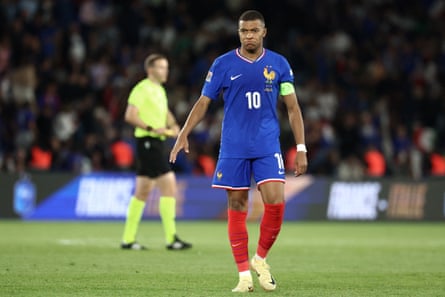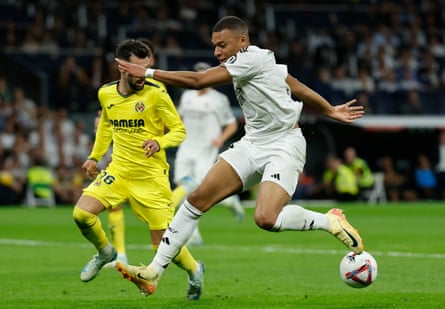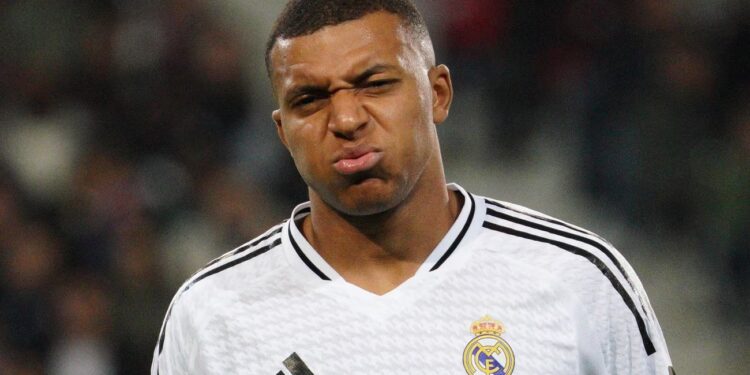Les Bleus’ captain has borne the brunt of the French public’s wrath and his current absence isn’t without controversy
In a year of sporting highs in l’Héxagone, the France national team has not been one of them, despite a run to the semi-final of this summer’s Euros. The likes of Léon Marchand and Teddy Riner were a symbol of a joyous summer of sport during the Olympic Games in Paris. In contrast, Les Bleus have stuttered and stumbled from one mini-crisis to another throughout the year, engendering a kind of malaise – even disgruntlement – of which Kylian Mbappé has become the symbol.
As captain, Mbappé is the face of a side that has flattered to deceive. As early as March, there were “warning signs” according to Mbappé, who denounced “deficient leadership” in a friendly defeat to Germany. Results improved in the summer but the mood would not lift.
Deschamps, whose contract was extended until after the 2026 World Cup in the wake of the run to the 2022 final in Qatar, has had his critics. Pragmatism or over-cautiousness, depending on how you wrap it, has always been Deschamps’ modus operandi, but it is much less popular when it does not see you lift the trophy at the end of the tournament.
It was an emotionless run to the semi-finals in Germany, with only one goal scored by a France player in open play. But, more than anyone, it is Mbappé that has borne the brunt of the wrath of the French public. It is reflected in a recent poll from Odoxa, which showed only 54% of the 1,000-plus questioned still had a good opinion of Mbappé, down 12%, while only 58% believe he is likable, down from 80% in 2019.

But the popularity of Mbappé, certainly at an all-time low, is also heard in the stands. The captain was booed during the international break in September – a response to a clumsy comment where he stated that concerns about Les Bleus’ playing style was “the least of his concerns”. He also received a hostile reception when he returned to France for the first time as a Real Madrid player, in Lille earlier this month.
“For different reasons, Kylian wasn’t in the best condition psychologically during the last international camp,” said Deschamps. Mbappé is not there at all this time around. And his absence is not without controversy.
Mbappé suffered a thigh injury in late September. While the blow was initially predicted to keep him out until after the international break, he came off the bench against Lille in the Champions League – on the eve of Deschamps’ squad announcement. Mbappé was then absent from that list but in the final game before the break he proceeded to start for Real Madrid against Villarreal.
Cue the outrage. Any and every former footballer and pundit in France had an opinion; not many reflected Mbappé in the most positive light. Patrice Evra denounced the power afforded to Mbappé, by former club Paris Saint-Germain and the national team. “It is not just Deschamps but the whole of France that gave Mbappé too much,” the former international told RMC Sport, with other pundits speculating Mbappé’s priorities now lie elsewhere since his summer move to Madrid.
The Irrésistibles Francais, the main France supporters group said that, within the context, it “wasn’t normal, as a captain” for Mbappé to be absent from the squad. The president of the French Football Federation (FFF), Philippe Diallo, attempted to douse the fire. “Didier spoke with Mbappé directly and with the medical staff at Real Madrid and chose not to select him but it doesn’t call into question Kylian’s attachment to the national team,” he said.

Deschamps, on numerous occasions, has backed up that version of events. The complaints about the hectic calendar, voiced by players and echoed by Diallo and Deschamps, also gives further credit to their argument. At a time where player welfare is overlooked, the France setup want to show they are listening.
But there is a broader context that is sustaining the outrage. Antoine Griezmann’s shock retirement certainly plays its part. Mbappé’s appointment after the retirement of Les Bleus’ most-capped player of all-time, Hugo Lloris, meant that Griezmann was overlooked.
The Atlético Madrid player reportedly felt undervalued at times by France. In 2019, it almost led to his retirement from international football and perhaps would have had Deschamps not travelled to talk him out of the decision. But this time, not even Deschamps was aware of Griezmann’s intentions as he called time on his France career.
Mbappé’s appointment as captain, many hypothesise, played a part. “The captaincy decision? He said that it affected him. He didn’t hide it. It’s legitimate; it’s normal,” Olivier Giroud told Téléfoot.
Granted, plenty of time elapsed between Mbappé’s appointment and Griezmann’s retirement, but the lines can be joined, and have been. “What we have learned this week is that the real captain has left, one that was knighted by fans, Antoine Griezmann,” said the Irrésisitbles Francais. The “good guy-bad guy” dichotomy has been drawn: Griezmann heroically exits the stage, while Mbappé, the chosen one, shirks his responsibilities to the national team – or so goes the script.
But there is one more ingredient, and it is a lack of relatability and that temptation of reminiscence, the onset of which is hard to fight amid the changing of the guard. Mbappé’s replacement as captain against Israel, Aurélien Tchouaméni, succinctly summarised where France are. “Over a period of time, a generation ends, a golden generation that has done so much for Les Bleus,” began Mbappé’s Madrid teammate.
“A new generation is emerging, our generation. We have to win, win titles and write our own history,” he added. The ending of the generation that won the 2018 World Cup in Russia was a process rather than a moment.
But it is a process that has accelerated recently. After the retirements of Lloris and then Raphaël Varane post-Qatar, Giroud and Griezmann have now also ended their international careers. With Mbappé absent, it means none of the players that started in the final against Croatia in 2018 are present in the current squad.
Within this generational shift, fans are looking for elements of continuity to cling on to. Mbappé is that. Upon his appointment, he was touted as this nexus – the one that bound old with the new, the emerging generation and the “golden generation”. And in his absence, the fragility and unease of this moment is deeply felt. It is heard on the radio, read in the newspapers and heard in the stands. And within all of the Mbappé noise, wider concern is implicit.
Mbappé, through his absence, has found himself at the centre of a perfect storm – a symbol of a more deeply entrenched malaise with the state of the France national team that he, more than anyone else, is capable of remedying … just not right now.
Source: The Guardian



Recent Comments